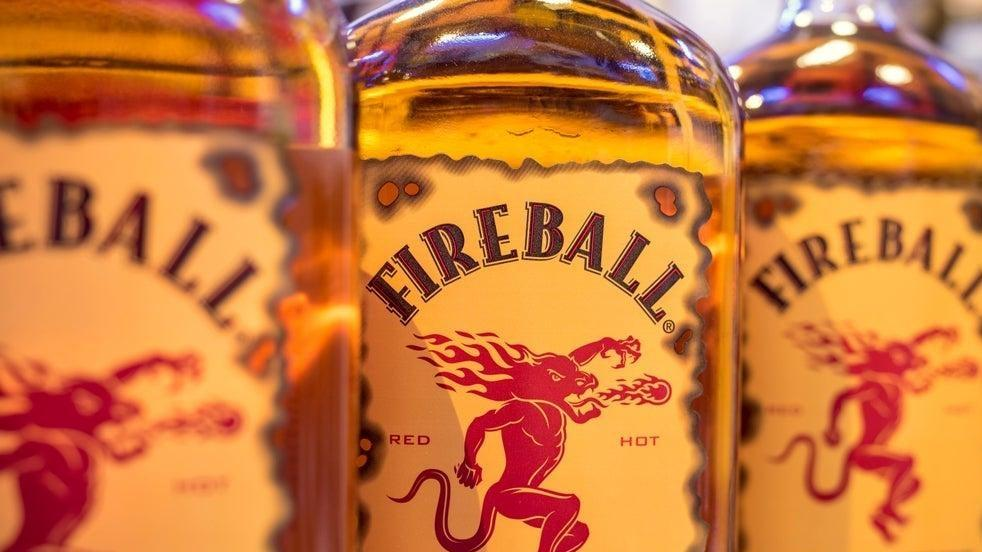The Truth About Gas Station Fireball
A class action lawsuit takes issue with the actual contents of Fireball Cinnamon.
Fireball, the spicy cinnamon whiskey that's good for getting drunk fast and pretty much nothing else, finds itself (appropriately enough) under fire, and not for the first time. Who could forget back in 2014 when the product was recalled in Europe (but not the U.S.) over concerns that it contained an ingredient found in antifreeze? Now, Fireball is back in the news. Only this time, the drama isn't over what it contains, but rather what it doesn't.
If you've ever gone into a gas station, bodega, smoke shop, or supermarket and wondered how they could sell Fireball at such non-liquor-store locations, wonder no more. It turns out the smaller, cheaper bottles of Fireball found near the register and the larger bottles of Fireball you buy at a liquor store are actually two different products—a fact that has led to a class action lawsuit.
While a standard bottle of Fireball has a label reading "Fireball Cinnamon Whisky," those little gas station bottles might simply read "Fireball Cinnamon." The difference is small, almost imperceptible: It's the exact same label as the liquor version, sans the word "whisky." Most consumers would likely not even realize they're buying a different product, but it turns out Fireball Cinnamon doesn't contain any whiskey at all. Instead, it's a flavored malt liquor, a la White Claw or Colt 45. This means it can be sold in stores that aren't allowed to sell spirits.
The lawsuit alleges that by making the design of the two bottles so similar, Fireball is intentionally misleading consumers. Whiskey Raiders also notes that the malt liquor variant has half the alcohol content of its distilled sibling, coming in at only 16.5% ABV, compared to the whiskey's 33%.
The lawsuit points out that the deception continues when you read the fine print at the bottom of the Fireball Cinnamon label: "Malt beverage with natural whisky & other flavors and caramel color," it reads. This means the product is made with natural whiskey flavors, as well as additional flavors, but is ambiguously worded and could be interpreted to mean "made with natural whiskey."
Grammatical loopholes! We've seen those play out on the national stage before. One notable example came in 2018, when a group of Maine dairy workers was awarded $5 million thanks to a missing Oxford comma in the labor law governing overtime pay.
As a result of what it views as Fireball's underhanded shenanigans, the class action lawsuit is seeking damages for anyone in Illinois, North Dakota, Wyoming, Idaho, Alaska, Iowa, Mississippi, Arkansas, Kansas, Arizona, South Carolina, and Utah who bought the low-grade Fireball "during the statutes of limitations."
While this may seem like a silly reason to sue a company, it's actually a common form of class action lawsuit. On the Institute for Legal Reform's list of The Most Ridiculous Lawsuits of 2022, eight out of the 12 were lawsuits against food companies over deceptive marketing. For example, a woman sued Kraft Heinz over the claim that Velveeta mac and cheese cups are not "ready in three and a half minutes" as advertised. It may take three and a half minutes in the microwave, sure, but that time doesn't include taking off the lid and filling the cup with water. The lawsuit claimed the plaintiff would have never purchased the product "had she known the truth."
While the Velveeta lawsuit seems frivolous, I think the Fireball one has more of a leg to stand on. It's easy to see how a brand would be incentivized to mislead consumers in the manner the lawsuit alleges: by making people believe they're buying whiskey instead of a flavored malt beverage, a company can sell that beverage at a higher price per volume, more consistent with the price point of spirits than other FMBs.
Then again, maybe I'm just salty because I, a purchaser of bodega Fireball in the state of New York, don't qualify for the class action. Win this case for me, guys.
